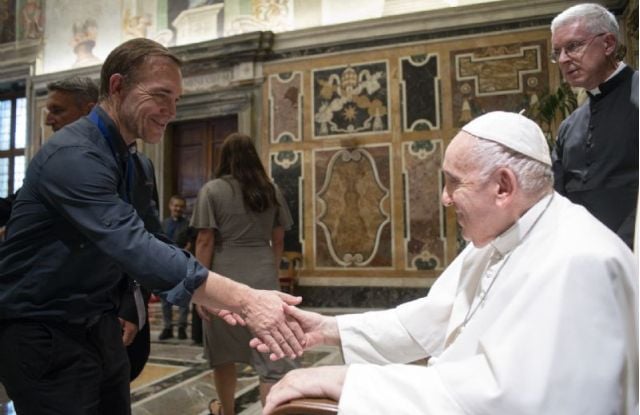

15 Theses of Church (part 2)
8 – Out of the hands of bureaucratic clergy and on towards the priesthood of all believers
No expression of a New Testament church is ever led by just one professional “holy man” doing the business of communicating with God and then feeding some relatively passive, religious consumers, Moses-style. Christianity has adopted this method from pagan religions, or at best from the Old Testament.
The heavy professionalization of the church since Constantine has been a pervasive influence long enough, dividing the people of God artificially into an infantilized laity and a professional clergy, and developing power-based mentalities and pyramid structures. According to the New Testament (1 Tim. 2:5), “there is one God, and one mediator also between God and men, the man Christ Jesus”. God simply does not bless religious professionals to force themselves in between Himself and His people. The veil is torn, and God is allowing people to access Himself directly through Jesus Christ, the only Way.
To enable the priesthood of all believers, the present system will have to change completely. Bureaucracy is the most dubious of all administrative systems, because it basically asks only two questions: yes or no. There is no room for spontaneity and humanity, no room for real life. This may be all right in politics and business, but not the church. God seems to be in the business of delivering His church from a Babylonian captivity of religious bureaucrats and controlling spirits into the public domain, putting it into the hands of ordinary people whom God has made extra-ordinary and who, as in the old days, may still smell of fish, perfume or revolution.
9 – Return from organized to organic forms of Christianity
The “Body of Christ” is a vivid description of an organic being, not an organized mechanism. Church consists, at the local level, of a multitude of extended spiritual families, which are organically related to each other as a network. The way these communities function together is an integral part of the message of the whole. What has become a maximum of organization with a minimum of organism, has to be changed into a minimum of organization to allow a maximum of organism. Too much organization has, like a straitjacket, often choked the organism for fear that something might go wrong. Fear is the opposite of faith, and not exactly a Christian virtue. Fear wants to control; faith can trust. Control, therefore, may be good, but trust is better. The body of Christ is entrusted by God into the hands of steward-minded people with a special charismatic gift to believe that God is still in control, even if they are not. Today we need to develop regional and national networks based on trust, not a new arrangement of political ecumenism, for organic forms of Christianity to re-emerge.
10 – From worshipping our worship to worshipping God
The image of much contemporary Christianity could be summarized as holy people coming regularly to a holy place on a holy day at a holy hour to participate in a holy ritual led by a holy man dressed in holy clothes for a holy fee. Since this regular performance-oriented enterprise called “worship service” requires a lot of organizational talent and administrative bureaucracy, formalized and institutionalized patterns developed quickly into rigid traditions. Statistically, a traditional one- or two-hour “worship service” is very resource-hungry but produces very little fruit in terms of discipling people, i.e. in changing their lives. Economically, it is a “high input, low output” structure. Traditionally, the desire to worship “in the right way” has led to much denominationalism, confessionalism and nominalism. This not only ignores the fact that Christians are called to worship “in spirit and in truth”, rather than in cathedrals holding songbooks. It also ignores the fact that most of life is informal, and so too is Christianity as “the Way of Life”. Do we need to change from being powerful actors and start acting powerfully?
11 – Stop bringing people to church, and start bringing the church to the people
The church is changing back from being a Come-structure to being a Go-structure. As a result, the church needs to stop trying to bring people “to church”, and start bringing the church to the people. The mission of the church will never be accomplished just by adding to the existing structure. It will take nothing less than a mushrooming of the church through spontaneous multiplication into areas of the world where Christ is not yet known.
12 – Rediscovering the Lord’s Supper as a real supper with real food
Church tradition has managed to celebrate the Lord’s Supper in a homeopathic and deeply religious form, characteristically with a few drops of wine, a tasteless cookie and a sad face. However, the Lord’s Supper was actually more a substantial supper with a symbolic meaning, than a symbolic supper with a substantial meaning. God is restoring eating back into our meeting.
13 – From denominations to city-wide celebrations
Jesus called a universal movement, and what came was a series of religious corporations with global chains marketing their special brands of Christianity and competing with each other. Through this branding of Christianity most of Protestantism has lost its voice in the world and become politically insignificant, more concerned with traditional distinctives and religious infighting than with developing a collective testimony before the world. Jesus simply never asked people to organize themselves into factions and denominations, and Paul spoke of it as “worldly”, a sign of baby Christians.
In the early days of the church, Christians had a dual identity: they were truly His church and vertically converted to God, and they then organized themselves according to geography, that is, converting also horizontally to each other on earth. This means not only Christian neighbours organizing themselves into neighbourhood or house churches, where they share their lives locally, but Christians coming together as a collective identity as much as they can for city-wide or regional celebrations expressing the corporateness of the church of the city or region. Authenticity in the neighbourhoods connected with a regional or city-wide corporate identity will make the church not only politically significant and spiritually convincing, but will allow a return to the biblical model of the city church, the sum total of all born-again Christians of a city or an area.
14 – Developing a persecution-proof spirit
They crucified Jesus, the leader of all the Christians. Today, His followers are often more into titles, medals and social respectability, or, worst of all, they remain silent and are not worth being noticed at all. “Blessed are you when you are persecuted,” says Jesus. Biblical Christianity is a healthy threat to pagan godlessness and sinfulness, a world overcome by greed, materialism, jealousy and any amount of demonic standards of ethics, sex, money and power. Contemporary Christianity in many countries is simply too harmless and polite to be worth persecuting. But as Christians again live out New Testament standards of life and, for example, call sin as sin, the natural reaction of the world will be, as it always has been, conversion or persecution. Instead of nesting comfortably in temporary zones of religious liberty, Christians will have to prepare to be again discovered as the main culprits standing in the way of global humanism, the modern slavery of having to have fun and the outright worship of Self, the wrong centre of the universe. That is why Christians will and must feel the “repressive tolerance” of a world which has lost its absolutes and therefore refuses to recognize and obey its creator God with His absolute standards. Coupled with the growing ideologization, privatization and spiritualization of politics and economics, Christians will – sooner than most think – have their chance to stand happily accused in the company of Jesus. They need to prepare now for the future by developing a persecution-proof spirit and an even more persecution-proof structure.
15 – The Church comes home
Where is the easiest place for a person to be spiritual? Is it, perhaps, hiding behind a big pulpit, dressed up in holy robes, preaching holy words to a faceless crowd, and then disappearing into an office? And what is the most difficult – and therefore most meaningful – place for someone to be spiritual? At home, in the presence of their spouse and children, where everything they do and say is automatically put through a spiritual litmus test against reality, where hypocrisy can be effectively weeded out and authenticity can grow. Much of Christianity has fled the family, often as a place of its own spiritual defeat, and then has organized artificial performances in sacred buildings far from the atmosphere of real life. As God is in the business of recapturing the homes, the church turns back to its roots – back to where it came from. It literally comes home, completing the circle of church history at the end of world history.
As Christians of all walks of life, from all denominations and backgrounds, feel a clear echo in their spirit to what God”s Spirit is saying to the church, and start to hear globally in order to act locally, they begin to function again as one body. They stop asking God to bless what they are doing – and start doing what God is blessing. They organize themselves into neighbourhood house churches and meet in regional or city celebrations. You are invited to become part of this movement and make your own contribution. Maybe your home, too, will become a house that changes the world.
by Wolfgang Simpson



Mr. Simpson’s comments are obviously well thought out yet I find them a bit introspective focusing on the individual and the body of Christ rather than heeding God’s commission to also “…subdue and rule.” We need to talk about what those two words actually mean. However, I think that God also expects us to “create the future” as well as transform the existing culture. We need a 16th Theses about how God expects us to turn this world right-side-up.